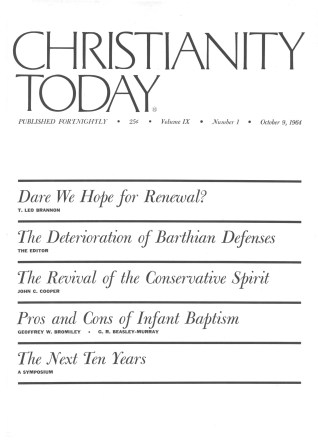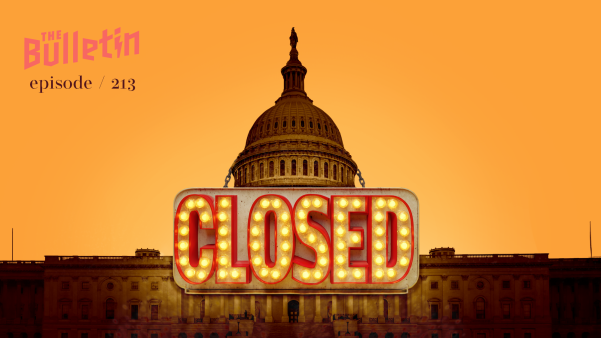There can be no further doubt of a tremendous resurgence of the conservative temperament in American religious and political opinion. The rapid growth of those denominations that shade off on the theological spectrum from conservative orthodoxy to fundamentalism, the success of the evangelical journal CHRISTIANITY TODAY, the widespread support for the evangelistic efforts of Billy Graham, and in the political realm the majority support of his party won by Senator Goldwater—these all attest to its presence and vitality. In the sense that it is now filling the great middle space between the fringe sects and the liberal leadership in the older church bodies it may be described as a new “third force” in American religious life. Despite the fall of Bible reading and devotions in the public school systems as the result of court decisions, and perhaps because of such decisions, the conservative temperament is being fanned into flame in all parts of the nation.
One gets the impression that the leaders of church and state, who are imbued with the liberal doctrines of the past forty years, are fearful over the prospect of conservatism’s becoming “respectable” again. H. L. Mencken’s snide reference to the population of the Bible Belt as the great “legion of the unwashed” is repeated, with variations, by those who consider believers in an inspired Bible sub-modern. On the other hand, those who deny every tenet of miraculous Christianity (as do the “Bultmannites”) are called “men come of age.” Moreover, what is done in the religious realm is carried out with gusto in the political realm. Supporters of the conservative position are identified en masse with the most extreme members of ultra-right-wing organizations. Without regard for facts, everyone who desires a reassessment of our public philosophy is labeled a crank, or worse, an unconscious traitor to basic American beliefs. If he is from California, he is automatically thought to be a sympathizer of the Birch Society; if from the South, he automatically favors the Klan. Right-wing groups are denounced, with never a word of warning about the dangerous militant Negro movements, the Black Muslims, or the most extreme leaders of CORE and SNCC. The partiality and unfairness of the vocal liberal leadership is patent to all but the most committed liberal. The “backlash” that is often spoken of may well develop as the backlash of the basic American sentiment of fair play and of sympathy for the underdog. Many Americans feel it is time to give the conservatives a fair hearing.
Civil Rights And Wrongs
But what of the Church? What meaning have the events of the past few months for her? Is the mounting tendency to resist the ever-increasing demands of the civil rights leadership a warning to the Church (which is so deeply involved in this issue) to stop and consider the wisdom of her actions? Are the deplorable tendency to move from passive demonstrations to lawless violence (as in Harlem) and the counteraction of segregationists to use violent means also (as in Mississippi) not clear-cut indicators that agitation based on the liberal interpretation of what is “Christian” and “American” ought to be calmed down? I believe that liberal church leaders have a heavy burden of guilt to bear because of their involvement in certain tactical maneuvers in the civil rights struggle that have led to bloodshed. The direct or indirect presence of representatives of the National Council of Churches in the Mississippi area, where several have already lost their lives, seems to me to compromise the Church’s mission. No matter how much we may believe in civil rights, Christians dare not instigate civil wrongs.
And yet, this neglect of biblical concerns for secular programs is but the outgrowth of a “liberal” movement that is decades old in America. That movement shifted the Church’s vision from a spiritual kingdom to a political kingdom that could come through social action. The Bible’s content was systematically undercut as something historically conditioned, a legendary or mythological growth that has little to do with the Church’s mission today; and thus a substitute gospel was needed. The “new gospel” was provided by the sciences of man—psychology, sociology, and the social impulse of Continental Socialism (especially German “Christian Socialism”). In a very real sense, the new theology (which was and is modernism, despite its change of labels from time to time) moved to occupy the same philosophical basis as the new political liberalism that was developing in response to the bewildering opportunities and problems that our industrialized, urbanized nation was facing. A Church that had thrown over its biblical mandate made common cause with a political philosophy that had thrown over the older belief in the responsibility of the individual for his own improvement and the rights of the component parts (states) of the nation, in order to attempt a novel solution to America’s very real problems of finance, unemployment, industrialization, and so on.
On Feet Of Clay
To its great credit, the liberal movement did build a dike that confined some of the flood waters that were sweeping over America. While no one can be sure that American prosperity would have returned had not World War II broken out, the “New Deal” did offer stop-gap measures to overcome some serious Depression-era problems. Again, although no one can say that Americans would have flocked back to the churches had the terrible ordeal of World War II and the rise of the nuclear threat not intervened, the newer theology (now called neo-orthodox!) did keep the denominations going and growing.
In spite of the setbacks that derived from the war, the church and the state in 1947 were firmly in control of a fairly happy situation in America. Only the rising divorce and alcoholism rates revealed the feet of clay beneath the body of brass.
What went wrong? Why are governmental policies so hotly debated and cordially condemned in so many quarters? What stopped the forward motion of the Church, so that now its growth rate is no more than equal with the population rise? What went so wrong that the political party in control from 1932 to 1954 was suddenly swept out of power? What provoked the remarkably close election of 1960? It is often said that the great Democratic plurality in Chicago, which offset and overrode the downstate Illinois votes, won the election for the Democratic party. Mr. Kennedy, surely an attractive candidate despite the fact that he was a Roman Catholic, squeaked through by the slightest majority in many states. Why this reaction? Certainly the Republicans who served as leaders from 1954 to 1960, and who offered themselves for re-election in 1960, were not notable conservatives.
The cold war has now lasted seventeen years—as long as World Wars I and II, the Spanish-American War, the Civil War, and the War of 1812 combined, with five years left over to cover all the banana wars in addition. In this struggle much more has occurred than the death of thousands of American servicemen (140,000 killed and wounded in Korea, 1950–54) and the expenditure of billions of American dollars (in 1948, 66 per cent of the United States government’s budget was for war-connected functions; in 1960, it was 72 per cent; it is considerably higher in 1964). The cold war has also revealed the basic weaknesses of the liberal philosophy adopted by so many of those who have ruled, educated, and preached to us for the last four decades. These weaknesses, which are primarily the results of a philosophy that has downgraded individual initiative and responsibility before man and a theology that has failed to stress man’s personal responsibility before God, are (in brief) the creation of feeble personalities that lack self-reliance and moral stamina. This lack of self-reliance has grown out of the emphasis placed on group effort and governmental (and institutional, including ecclesiastical) direction. Moral stamina has been lost because the roots of the morality that the Church continues to try to teach and the civil law to require have been cut by the overthrow of faith in the God of the Bible, doubt as to the meaning of revelation, and the substitution of psychological theories for the clear preaching of the historic faith.
The poor showing of many soldiers in North Korean prison camps, the upsurge of juvenile delinquency, the increase of illegitimate births, and the spread of addiction to alcohol and dope are not the reasons for the conservative revival; they are rather symptoms of the social malady that conservatism wants to cure.
As the casualty list in Viet Nam continues to mount, Communist subversion continues to operate in Cuba, and reports of violence between the races come to us from city and country, North and South, there can be little reason to question the desire of the majority of our people for a return to sounder standards of theology and philosophy. For this reason many citizens who are neither racists nor extremists are supporting theological, philosophical, and political movements that echo their historic beliefs.










